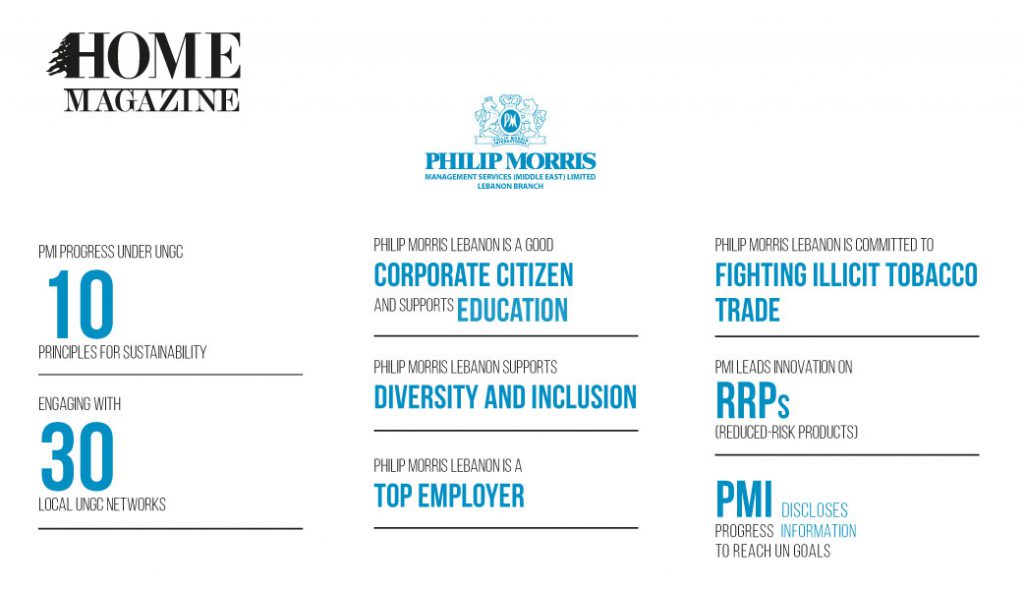Philip Morris International (PMI) joined the United Nations Global Compact (UNGC) in 2015. The UNGC is a voluntary public-private partnership aimed at advancing global sustainability goals through business commitment to ten fundamental principles relating to Human Rights, Labor Rights, Environmental Responsibility, and Anti-corruption measures.
PMI published in June 2016 its first ‘Communication on Progress’ report in which it illustrates how Philip Morris International, and consequently its branch in Lebanon, otherwise known as ‘Philip Morris Management Services (Middle East) Limited – Lebanon Branch’ (PMMS), manage their business with regard to the Ten Principles and describes the company’s policies, activities, measurements and future plans for key topics across the value chain. PMI is also taking action to support broader UN goals and to participate in local UN Global Compact networks. At this time, the company has engaged at the market level with nearly 30 local UN Global Compact networks, including the network in Lebanon.
In Lebanon, Philip Morris actively carries out a number of corporate social responsibility initiatives that seek to provide underprivileged members of the local community with education opportunities where they would otherwise not have them. Working with the Syndicate of Lebanese Tobacco Growers, PMMS has succeeded in supporting the educational ventures of tobacco farmers’ children, and in bringing educational activities to underprivileged regions of the country.
Further to the company’s commitment to sustainable development, at Philip Morris, the priority is to attract, support and hold on to diverse and unique individuals from every corner of the planet – no matter what the age, background, gender, religion, sexual orientation or physical ability.
The company’s diverse, multifaceted and multigenerational workforce is its best asset as it fosters a culture of openness and respect for others.
Principle ten of the UNGC regards anti-corruption practices. Preventing illegal sales of tobacco products is one of the company’s core business strategies. It is a key element of sustainability since reducing illicit trade is not only good for PMMS’ business, but also important to mitigate the devastating consequences illicit trade has on governments, societies and communities. Illicit trade accounts for 10-12% of consumed cigarettes worldwide and strips governments of tax revenues of up to USD 40-50 billion each year. At the market level, PMMS has actively and continuously collaborated with local authorities to reduce illicit tobacco trade in Lebanon, effectively returning a considerable amount of taxes to the national economy.
On the research and innovation front, and as Philip Morris understands the millions of current adult smokers who are looking for less harmful, yet satisfying, alternatives to smoking, PMI embarked on a journey to give them that choice and fulfill that commitment by pursuing its long-term vision for a smoke-free future. Society expects the company to act responsibly, and that is why PMI announced its ambitious goal to lead a full-scale effort to ensure that Reduced-Risk Products (RRPs) ultimately replace cigarettes. The company envisions a smoke-free world where RRPs provide a much better choice for adult smokers than conventional cigarettes.
PMI’s release of its ‘Communication on Progress’ report under the UNGC sets the company and each of its subsidiaries up to continuously, transparently, and publicly disclose information about its progress toward reaching UN sustainability standards, and invites a stakeholder discussion on how best to achieve a post-2015 development agenda.


































